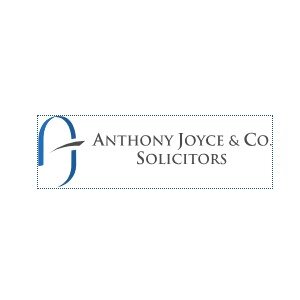Best Debt & Collection Lawyers in Dublin
Share your needs with us, get contacted by law firms.
Free. Takes 2 min.
List of the best lawyers in Dublin, Ireland
About Debt & Collection Law in Dublin, Ireland
Debt & Collection law encompasses the rules and regulations governing the recovery of owed money or property. In Dublin, Ireland, the legal landscape is shaped by both domestic statutes and European Union regulations. The framework ensures that creditors can seek repayment while also protecting debtors from unfair practices. The goal is to balance the rights and responsibilities of all parties involved.
Why You May Need a Lawyer
People may require legal assistance in Debt & Collection for various reasons. Some common situations include:
- Unfair Treatment: If you're a debtor subjected to unfair, aggressive, or unlawful collection practices.
- Unpaid Debts: If you’re a creditor struggling to recover a significant amount of money or property from a debtor.
- Contract Disputes: When there are disagreements over the terms of a loan or credit agreement.
- Bankruptcy: If you’re facing bankruptcy and need legal advice on how to proceed.
- Defending Claims: If you’re contesting a debt collection action brought against you.
Legal expertise can provide valuable guidance, ensuring that actions taken are within the boundaries of the law and that your rights are protected.
Local Laws Overview
The following are some key aspects of local laws relevant to Debt & Collection in Dublin, Ireland:
- Consumer Protection Act 2007: This act protects consumers from unfair business practices, including debt collection tactics.
- European Communities (Consumer Credit Agreements) Regulations 2010: These regulations stipulate the requirements for credit agreements, providing transparency and fairness in credit relationships.
- Irish Statute of Limitations Act 1957: This act outlines how long a creditor has to bring a debt collection action, typically six years from the date the debt became due.
- Personal Insolvency Act 2012: Provides various options for debtors in financial distress, including Debt Relief Notices, Debt Settlement Arrangements, and Personal Insolvency Arrangements.
- Laws on Harassment: Provisions are in place to protect debtors from harassment and undue pressure from creditors.
Frequently Asked Questions
What is the statute of limitations on debt in Dublin, Ireland?
In Dublin, creditors generally have six years from the date the debt became due to initiate legal action to recover it.
Can a debt collector contact me at work?
Debt collectors can contact you at work, but they must abide by fair practice guidelines and cannot harass or unduly pressure you.
What happens if I ignore a debt collection notice?
Ignoring a debt collection notice can lead to legal action being taken against you, including court judgments and potential garnishment of wages.
Can I negotiate with debt collectors?
Yes, you can negotiate with debt collectors, and it is often advisable to do so. You may be able to agree on a repayment plan or a reduced payment settlement.
What are my rights if I'm being harassed by a debt collector?
Under Irish law, you are protected from harassment by debt collectors. This includes any action that amounts to undue pressure or threatening behavior.
Can my debt be sold to another company?
Yes, creditors can sell your debt to another company, which will then assume the rights to collect the debt from you.
What happens if I am unable to pay my debts?
If you are unable to pay your debts, you may consider insolvency options, such as Debt Relief Notices or Debt Settlement Arrangements, as outlined in the Personal Insolvency Act 2012.
How can a lawyer help me in a debt collection case?
A lawyer can help by negotiating with creditors, representing you in court, advising on possible defenses, and ensuring your rights are protected throughout the collection process.
Are there fees associated with hiring a debt collection lawyer?
Yes, hiring a debt collection lawyer generally involves fees. It is advisable to discuss fee structures and payment options upfront during your initial consultation.
Can I dispute a debt if I believe it is incorrect?
Yes, if you believe a debt is incorrect, you have the right to dispute it. Providing evidence to support your claim can aid in resolving the dispute in your favor.
Additional Resources
For additional assistance on Debt & Collection matters, consider consulting the following resources:
- Money Advice and Budgeting Service (MABS): Provides free and confidential advice on managing debt.
- Citizens Information Board: Offers extensive information and support on legal rights and obligations concerning debt and bankruptcy.
- The Central Bank of Ireland: Offers guidelines and regulations governing consumer credit and debt collection practices.
- Law Society of Ireland: Provides a directory of licensed solicitors specializing in Debt & Collection.
Next Steps
If you require legal assistance in Debt & Collection, consider taking the following steps:
- Consult an Expert: Schedule a consultation with a solicitor experienced in Debt & Collection law.
- Gather Documentation: Collect all relevant documents, such as credit agreements, payment records, and correspondence from debt collectors.
- Understand Your Rights: Familiarize yourself with your legal rights and obligations under Irish law.
- Explore Resolution Options: Work with your lawyer to explore various options for resolving your debt, including negotiation, payment plans, or legal defenses.
- Take Action: Follow through on the legal advice provided by your lawyer to address your Debt & Collection issue effectively.
Taking these steps can help you navigate the complexities of Debt & Collection law and work towards a favorable resolution to your situation.
Lawzana helps you find the best lawyers and law firms in Dublin through a curated and pre-screened list of qualified legal professionals. Our platform offers rankings and detailed profiles of attorneys and law firms, allowing you to compare based on practice areas, including Debt & Collection, experience, and client feedback.
Each profile includes a description of the firm's areas of practice, client reviews, team members and partners, year of establishment, spoken languages, office locations, contact information, social media presence, and any published articles or resources. Most firms on our platform speak English and are experienced in both local and international legal matters.
Get a quote from top-rated law firms in Dublin, Ireland — quickly, securely, and without unnecessary hassle.
Disclaimer:
The information provided on this page is for general informational purposes only and does not constitute legal advice. While we strive to ensure the accuracy and relevance of the content, legal information may change over time, and interpretations of the law can vary. You should always consult with a qualified legal professional for advice specific to your situation.
We disclaim all liability for actions taken or not taken based on the content of this page. If you believe any information is incorrect or outdated, please contact us, and we will review and update it where appropriate.











